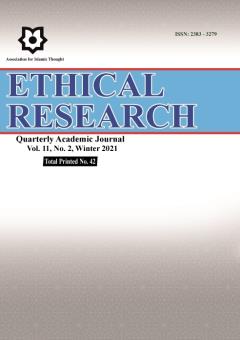The cassock of Meritocracy legal system, over the status of human dignity as a Ethics concept
Subject Areas : Ethics and Islamic Education
Saeid Ghabidian
1
,
ali akbar gorji
2
,
Bijan Abbasi
3
![]()
1 - University of Tehran
2 -
3 - University of Tehran
Keywords: administration administration of public affairs, Ethics, Human dignity, legal system, Meritocracy.,
Abstract :
Human dignity is one of the most important issues in the field of law . This issue is important because is known as the basis of many of the human rights, privileges and duties. Today, human dignity not only is recognized as an indestructible right, but also is the basis of human rights. Whereas the administration of public affairs relies on legal system, specifies the roles, rights and duties, responds the needs of society, affects the fate of society and human dignity. Meritocracy as a specified concept in the management, and because of its influence on the proper administration of public affairs, via responding to human needs, predicts human abilities and has an important rule in improving the legal system. The research question of this study is whether this research is descriptive, analytical and library based whether meritocracy in the legal system leads to human dignity? It seems that meritocracy because of its influence on creation the legal system, via responding to human needs and the creation a describe public administration, leds to the improvement of public ethics and human dignity. It would be noted that this research is Descriptive and analytical method library method and the library compilation method and by reviewing and critisizing the information, to describe and interpret what should be.
Moein M. (2003). Moein Pocket dictionary. Tehran: zarrin publications.(In Persian)
Gladden EN.(1952). An Introduction to Public Administration. London: Staples publication.
Dehkhoda AK. (1994). Dictionary. 1st ed. Tehran: Tehran university publications. (In Persian)
Jaffari-Tabrizi MT. (1991).Global human rights from the perspective of Islam and the West.Tehran: Publications of the Office of International Law Services of the Islamic Republic of Iran.(In Persian)
Ataa-far A, Azarbayejani K. (2001). Investigating the amount of meritocracy in selecting public and private sector managers. Management knowledge. 14(54):15-38.(In Persian)
Saket MH. (1992). Jurisprudence, the knowledge of law. Mashhad: first publications. (In Persian)
Shonberg S. (2008). Legitimate expectations in administrative law. Translated by: Ranjbar A. Tehran: Mizan publication.
Kelsen H. (2008). Lean legal theory. Translated by: Nematollahi S. Tehran: Publication of Institute of Domain and University
Ebdali M. (2012).Legal approaches and extra-legal approaches. Tehran: Mizan publication.(In Persian)
Saljooghi M. (2011). Searches for the understanding of man and the civilization he has made in his society and the error he has made. Tehran: Mizan publication.(In Persian)
Pour-ezzat AA, Dehghani-kasvayi MS. (2015). Recognizing the identity of government management and knowledge management. Public Management Research.(30): 5-31. (In Persian)
Mckay S, Micheal M, Sean M and etc.(2015). Evidence-based policymaking and the public interest: lessons in legitimacy, Town Planning Review. 2(86).
Ansari MM. (2007). Political elitism. Tehran: Dadgostar publication.(In Persian)
Chase R.(1997).The knowledge based organization an international survey. Journal of knowledge management.
Sen A. (2000). Justice in Meritocratic Environments. Meritocracy and Economic Inequality. Editors: Kenneth Arrow, Samuel Bowles, Steven Durlauf, Princeton University Press.
Golkar B, Nasehifar V. (2002).Overview of meritocracy. Journal of Management Development .(8): 7-10. (In Persian)
Peters, Guy B. (2005).The Problem of Policy Problems, Journal of Comparative Policy Analysis. Research and Practice, 7(4).
Rajaei Z, Danesh-fard K, Faghihi A. (2017). Formation of policy in the field of administrative system health in Iran. Public Management Research. (38): 5-34. (In Persian)
Ehsani-konari G. (2009). Lights Of Life(Inspirational words from world celebrities).Tehran: Scientific Publications .(In Persian)
Vakil AS, Askari P. (2009). The constitution in the current legal order. 3st ed. Tehran: Majd publications.
211 |
نوع مقاله: پژوهشی
صفحات 222- 211
قبای نظام حقوقی شایستهسالاری
بر قامت کرامت انسانی به عنوان مفهومی اخلاقی
سعید قبیدیان 1
علی اکبر گرجی ازندریانی 2
بیژن عباسی 3
چکیده
یکی از موضوعات مهم در قلمرو حقوق، کرامت انسانی است. این موضوع از این جهت دارای اهمیت است که خود پایه بسیاری از حقوق، امتیازات و تکالیف انسانی شناخته میشود و امروزه کرامت انسانی نه تنها به عنوان یک حق غیرقابل سلب شناخته میشود، بلکه مبنای حقوق بشر است. از آنجایی که اداره امور عمومی با تکیه بر نظام حقوقی، نقشها، حقوق و تکالیف را در یک جامعه مشخص میکند، و به نیازهای جامعه پاسخ میدهد، بر سرنوشت جامعه و کرامت انسانی تاثیرگذار است. شایستهسالاری به عنوان مفهومی شاخص در مدیریت، به دلیل اینکه به توانمندی انسانها و تبدیل آن به توانایی توجه کرده و نقشها، حقها و تکالیفی برای بهرهمندی از تواناییهای انسانها در اجتماع، پیشبینی میکند، نقش بسزایی در بهبود نظام حقوقی دارد. پرسش پژوهش پیش رو این است که آیا شایستهسالاری در نظام حقوقی منتهی به کرامت انسانی میگردد؟ به نظر میرسد که شایستهسالاری به دلیل تاثیری که در ایجاد نظام حقوقی کارآمد از طریق پاسخگویی به نیازهای انسان و ایجاد اداره مطلوب امور عمومی دارد، منتهی به بهبود اخلاق عمومی و کرامت انسانی میشود. پژوهش پیشروی، با روش توصیفی و تحلیلی و روش گردآوری کتابخانهای ، بابررسی و نقداطلاعات، به توصیف و تفسیر آنچه که باید باشد، میپردازد.
واژگان کلیدی
اداره امور عمومی، اخلاق، شایستهسالاری، کرامت انسانی، نظام حقوقی.
[1] . دانشجوی دوره دکترای رشته حقوق، گرایش حقوق عمومی، دانشگاه تهران، واحد پردیس بینالمللی کیش. (نویسنده مسئول) Email: Ghabidian.s3@gmail.com
[2] . دانشیار دانشکدهی حقوق، دانشگاه شهید بهشتی تهران. Email: Gorji110@yahoo.fr
[3] . دانشیار دانشکدهی حقوق، دانشگاه تهران. Email: babbasi@ut.ac.ir
تاریخ دریافت: 8/10/1398 پذیرش نهایی: 25/12/1398


